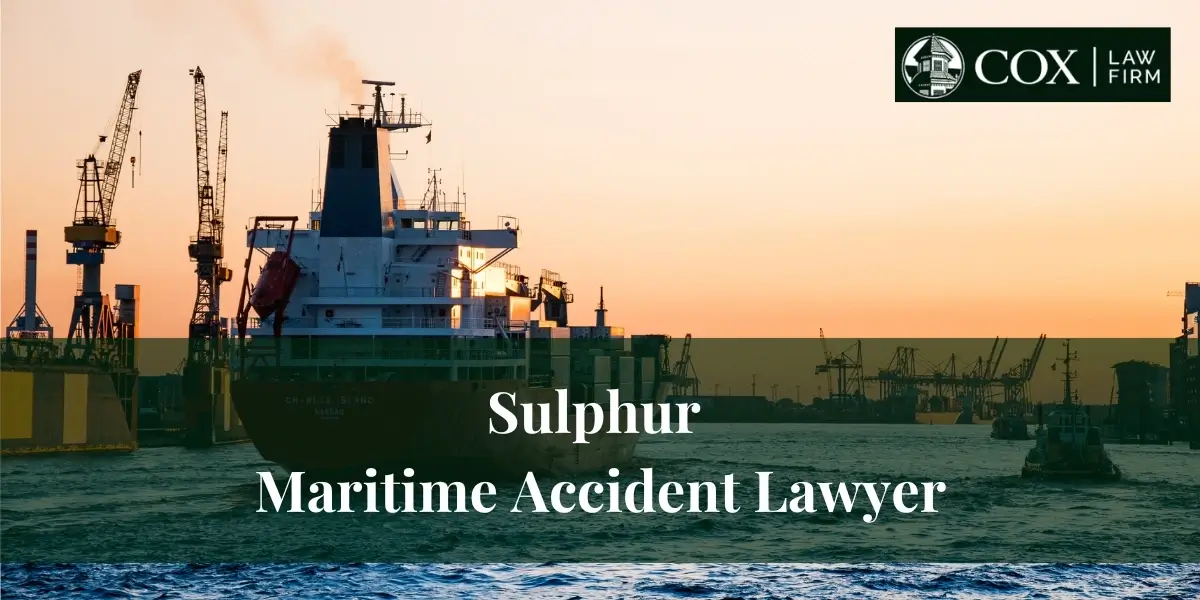Sulphur Maritime Accident Lawyer
Sulphur Maritime Accident Attorney
Maritime work is dangerous. Workers deserve fair treatment when carelessness causes injury. Knowing which rules protect you depends on your work. A Sulphur maritime accident lawyer can guide you through the next steps in your claim.

We Care About People
At Cox Law Firm, we listen first and provide answers later. Former maritime workers have praised our team for going beyond expectations. Our record includes turning around cases that other lawyers gave up on. We bring our years of experience to every case.
Common Maritime Accidents in Sulphur
Sulphur is close to the Gulf of Mexico. This means that offshore rigs and ships operate daily. Workers in this region face real risks. The environment is sometimes unstable and involves heavy machinery.
Many injuries happen during deck operations. In 2023, the Bureau of Safety and Environmental Enforcement (BSEE) reported 375 lifting-related incidents on offshore sites. These kinds of events often involve dropped loads. Some workers get hurt by falling cargo.
Fire and gas leaks also pose a danger. BSEE documented 149 fire incidents in 2023. These incidents can cause long-term burns. Lapses in safety procedures can put workers at risk.
Who Is Covered Under Maritime Law?
Many different types of workers can qualify for protection under maritime law. The classification depends on what the job involves. Common classifications include:
- Seamen. These are crew members who spend a large part of their time working on a vessel. They may be on a variety of vessels, not just boats. Seamen may qualify for rights under the Jones Act if they are injured on the job.
- Longshoremen. Longshoremen load cargo on docks. They often work near ships, even if they don’t travel with them. These workers are usually covered by the Longshore and Harbor Workers’ Compensation Act (LHWCA).
- Harbor workers. People who maintain or build vessels often fall under this group. They often work in shipyards. Their claims usually fall under the LHWCA.
- Offshore oil workers. Workers on oil platforms may qualify under the Jones Act or other maritime laws. Their classification depends on whether the rig is considered a vessel.
- Support crew. Smaller roles like deckhands still fall under seaman status if their work ties closely to the vessel. These workers can usually file under maritime law if they get injured at sea.
Each job has different legal rights. Workers should not assume they are protected just because they don’t work on a ship full-time.
Legal Rights After a Maritime Accident
After an injury, maritime workers have rights that are different from those in land-based jobs. One key right is to maintenance and cure. That means the employer must pay for daily living expenses until the worker reaches recovery.
Seamen also have the right to file a claim under the Jones Act. This covers employer negligence. This can include things like poor training or broken equipment. The Jones Act lets injured workers seek damages beyond medical bills.
Another part of maritime law protects workers from unseaworthy vessels. If the vessel was unsafe, the worker may have a separate claim against the ship’s owner. These claims focus on the condition of the equipment, not just the employer’s action.
Steps to Take After an Accident
The first thing any injured maritime worker should do is report the injury. Delays can hurt a claim. They can make it harder to prove what happened. Workers should tell their supervisor and fill out an accident report. Get a copy for your own records.
Medical treatment should be followed immediately. Even if the injury seems small, it can worsen over time. Early care can support a future claim. Workers should request a doctor they trust. They don’t have to use a doctor who’s chosen by the company.
Photos and detailed notes can make or break a case. The more details a worker saves, the stronger the case may be. In 2023, BSSS reported 203 offshore injuries. That number shows how often these events happen. Workers should contact a maritime attorney as soon as possible. Legal advice early in the process can help avoid mistakes.
Why Do I Need an Attorney?
Maritime law is not like other injury law. Federal rules apply instead of state ones. Mistakes in paperwork can lead to denial.
A maritime attorney understands what courts need to see in these cases. Gathering the right documents and building the case takes experience. Not every injury lawyer knows how to do that.
FAQs
What Does Maritime Law Cover?
Maritime law covers injuries related to work on or near navigable waters. It includes the Jones Act. This gives seamen the right to file a claim against employers for negligence. It also includes general maritime law. These rules apply across the Gulf Coast, including Sulphur, Louisiana. People who work on ships are often covered by this law.
Who Can File a Maritime Injury Claim in Sulphur?
Those who can file a maritime injury claim in Sulphur include those injured while working on or near navigable waters. This can include seamen and longshoremen. An important factor is the worker’s connection to a vessel. People who load ships may also qualify. The exact rules depend on the specific job. It is also affected by where the injury happened.
How Is a Maritime Injury Claim Different From a Workers’ Compensation Case?
A maritime injury claim is different from a workers’ compensation case because they each follow a different system. A maritime worker might have to prove fault from the employer. In return, workers’ compensation cases often pay only limited benefits. However, they usually do not have to prove fault to receive benefits.
Can I File a Claim Against My Employer After a Maritime Injury in Sulphur?
You can file a claim against your employer after a maritime injury in Sulphur under the Jones Act. Unlike normal workers’ comp, maritime law allows claims for unsafe working conditions. The claim has to show how the employer’s actions or lack of action led to the injury. This right can make a big difference in what compensation is available.
Get What You’re Owed
Maritime cases are unique because they involve both state and federal law. Each case deserves a close look. Help is available for those injured in a maritime accident. Schedule a consultation with Cox Law Firm to speak with someone who understands your situation.
Request Your
Free Consultation
Fields Marked With An “ * ” Are Required

